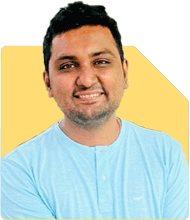Krishna Kumar | Answer |Ask -Follow
Workplace Expert - Answered on Feb 13, 2024
Before branching out on his own, he worked with companies like Microsoft, Rediff, Flipkart and InMobi.
With over 25 years of experience under his belt, KK is a regular speaker at industry events and academic intuitions, both in India as well as abroad.
KK completed his MBA in marketing from the Sri Sathya Sai Institute of Higher Learning in Andhra Pradesh and his management development programme from XLRI, Jamshedpur.
He has also completed his LLB from Nagpur University and diploma in PR from Bhavan’s College of Management, Nagpur, where he was awarded a gold medal.... more

I have 18 years IT experience as Developer,team lead,Manager(initial) Have done fairly well in career so far. Over past few years NOT enjoying handling teams especially, daily scrums etc,(agile etc). In new job which I switched in 2021 consciously took a developer role. Very happy with this role, but issue is after some time companies expect you to lead teams even if you start afresh as developer. As current job contract coming to end, have to again look for a new one. I have reduced my experience to 11 years (as at 18 years, no one will give senior developer roles). My tech stack is Microsoft .Net. Financially I am good, and no dependents. Ready to take a pay cut. What other career options/ line of work can I do? Wish to remain in IT ? To summarize, I wish to remain an individual contributor.
You can tell your potential employer that you want to be in IC role and they will be happy to oblige given your vast experience and the fact that you are willing to take a pay cut.
Alternatively you can explore freelancing.
All the best.
IC means individual contributor role...basically developer role.
Please don't tamper with your resume maintain its authenticity.
All the best.
All the best
You may like to see similar questions and answers below
Abhishek Shah | Answer |Ask -Follow
HR Expert - Answered on Aug 23, 2023
Patrick Dsouza |1429 Answers |Ask -Follow
CAT, XAT, CMAT, CET Expert - Answered on Jun 05, 2024
Anu Krishna |1754 Answers |Ask -Follow
Relationships Expert, Mind Coach - Answered on Dec 18, 2025
Anu Krishna |1754 Answers |Ask -Follow
Relationships Expert, Mind Coach - Answered on Dec 18, 2025
Anu Krishna |1754 Answers |Ask -Follow
Relationships Expert, Mind Coach - Answered on Dec 18, 2025
Chocko Valliappa |544 Answers |Ask -Follow
Tech Entrepreneur, Educationist - Answered on Dec 18, 2025
Chocko Valliappa |544 Answers |Ask -Follow
Tech Entrepreneur, Educationist - Answered on Dec 18, 2025
Chocko Valliappa |544 Answers |Ask -Follow
Tech Entrepreneur, Educationist - Answered on Dec 18, 2025
Anu Krishna |1754 Answers |Ask -Follow
Relationships Expert, Mind Coach - Answered on Dec 18, 2025
Chocko Valliappa |544 Answers |Ask -Follow
Tech Entrepreneur, Educationist - Answered on Dec 18, 2025
Chocko Valliappa |544 Answers |Ask -Follow
Tech Entrepreneur, Educationist - Answered on Dec 18, 2025
Naveenn Kummar |236 Answers |Ask -Follow
Financial Planner, MF, Insurance Expert - Answered on Dec 18, 2025


























